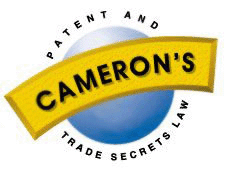
Case Comment
Quantel Ltd. v.
Spaceward Microsystems Ltd.
citation(s): [1990] R.P.C. 83 (Patents Court per Falconer J.)
 Case Comment |
Quantel Ltd. v.
|
copyright 1997 Donald M. Cameron, Aird & Berlis
"A patentee often works solitarily; he has very little idea of what others are doing, and, I think I may say, that in the enormous majority of instances, if not universally, he has no complete knowledge of what has been done by others in connection with the matter on which he is working. The inventive acts, by which he arrives at the invention for which he finally obtains protection, may be inventive acts, which have started far behind the level of public knowledge at the time, and much of his work, truly inventive so far as he is concerned, has been to reinvent that which others, without his knowledge, have invented. I can appeal to my own experience in saying that an inventor is generally startled to find, when there comes a patent action, that prior Specifications are produced which approach closely to his invention and of the existence of which he had not the very slightest idea. The consequence is that the inventive act of the inventor can have no relevance or effect; it is a thing which depends on this knowledge of what others had done. Then, are we to say that he is to state what would have been the inventive act, supposing him to know the whole knowledge of the world. Just consider for a moment what an impossible burden that would be to put upon patentees: that they must correctly know the whole knowledge of the world, much of which may be practice or user by members of the public but not generally known; for such a user is just as much a bar to a step being inventive as a printed publication would be. Of course if his ignorance has led him to claim something which is not novel he has to take the penalty. That is necessary. He has chosen at his own risk to ask for and take a monopoly as against the public, and the consequence is, that if, which the best of faith, he has asked for too much he must suffer for it. But to say that he must also ascertain, under the penalty of his Patent being bad, everything that preceded his invention, every approach for every side that persons have made to it, and must correctly indicate the little step which he has made in addition to these, most of which he never knew, would be to require something of him which would be perfectly idle, so far as regards utility to the public, and grossly unjust so as the patentee is concerned. I say more. I say it is an absolutely impossible task, because in almost all cases these inventions have been approached from many sides."
Return to:
Cameron's IT Law: Home Page; Index
Cameron's Canadian Patent & Trade Secrets Law: Home Page; Index